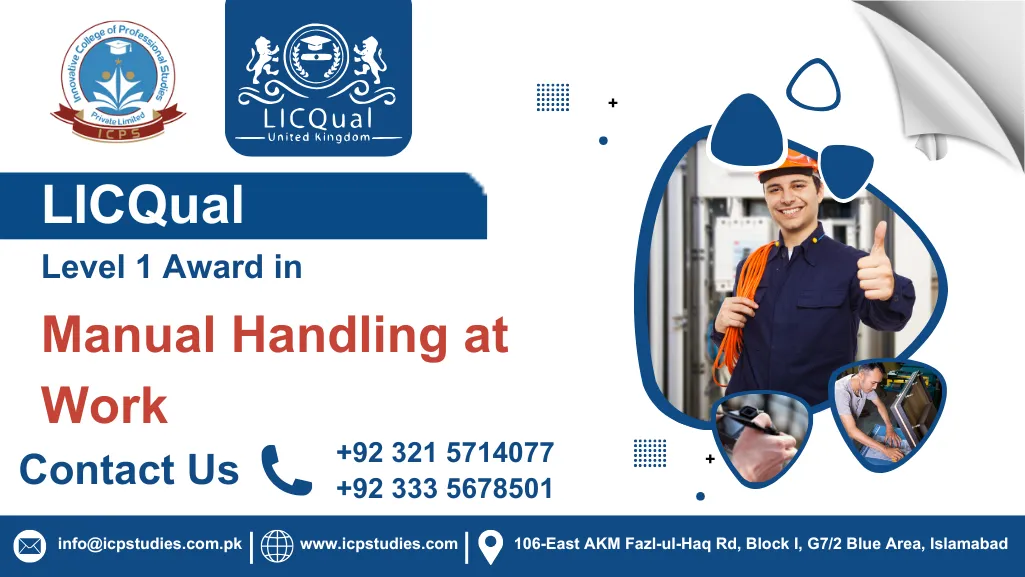The LICQual Level 1 Award in Manual Handling at Work is a foundational course designed to equip individuals with the essential skills and knowledge required to safely handle loads in the workplace. Whether you’re a new employee or an employer looking to ensure workplace safety, LICQual Level 1 Award in Manual Handling at Work provides the perfect starting point for understanding the core principles of manual handling and LICQual Level 1 Award in Manual Handling at Work impact on health and safety. With practical techniques and expert guidance, you’ll learn how to reduce the risk of injury and improve efficiency in your daily tasks.
Manual handling is a key component of health and safety regulations, and this qualification helps individuals comply with legal requirements while promoting a safer work environment. Upon completion of the LICQual Level 1 Award in Manual Handling at Work, you will be able to demonstrate safe lifting practices, reduce physical strain, and understand how to prevent common injuries caused by improper manual handling techniques.
Enrolling in LICQual Level 1 Award in Manual Handling at Work provides workers with confidence in carrying out manual handling tasks safely while ensuring they contribute to a healthier and safer working environment. LICQual Level 1 Award in Manual Handling at Work is an excellent starting point for those looking to strengthen their workplace safety knowledge and practices. LICQual Level 1 Award in Manual Handling at Work is ideal for individuals in a variety of sectors, including retail, healthcare, construction, and warehousing, where manual handling tasks are a daily part of the job.
All About LICQual Level 1 Award in Manual Handling at Work
Course Overview
The LICQual Level 1 Award in Manual Handling at Work is an entry-level qualification designed to provide learners with essential knowledge and practical skills for safe manual handling practices in the workplace. It introduces participants to the fundamental principles of manual handling, focusing on how to minimize risks, prevent injuries, and comply with workplace safety standards.
This course is particularly valuable for individuals working in roles where lifting, carrying, pushing, or pulling tasks are part of daily responsibilities. Learners who enroll will gain an understanding of correct posture, safe handling techniques, and the importance of risk assessments in reducing workplace accidents.
By the end of the program, learners will be able to apply safe manual handling methods in real work environments, protecting both themselves and their colleagues. Enrolling in this course provides workers with confidence in carrying out manual handling tasks safely while ensuring they contribute to a healthier and safer working environment.
Study Units
- Introduction to Manual Handling and Workplace Safety
- Understanding Manual Handling Hazards and Risks
- Principles of Safe Manual Handling
- Techniques for Lifting, Carrying, and Lowering Objects Safely
- Reducing the Risk of Injury During Manual Handling Tasks
- The Role of Manual Handling in Occupational Health and Wellbeing
- Learners must be at least 14 years of age or above at the time of enrollment.
- No prior qualifications or work experience are required, making it suitable for beginners.
- Basic understanding of English language (reading and listening) is needed to follow course instructions.
- Applicants should be physically capable of performing light manual handling activities during training.
- Open to individuals from all sectors, especially those involved in warehousing, construction, healthcare, hospitality, or logistics.
- A genuine interest in learning about workplace safety and manual handling techniques is expected.
- Must be motivated to enroll and actively participate in both the theoretical and practical aspects of the training.
- Individuals who wish to enroll in a course to gain basic skills in safe manual handling practices.
- Employees working in industries such as warehousing, logistics, healthcare, construction, retail, or hospitality where lifting and carrying tasks are common.
- New staff members who need introductory training in manual handling as part of their workplace induction.
- Students or entry-level workers looking to build a foundation in occupational health and safety.
- Employers who want their staff to receive certified training in manual handling to reduce workplace accidents.
- Individuals with little or no prior training in manual handling but eager to improve their safety awareness.
- Workers aiming to meet legal and organizational requirements for workplace safety training.
Learning Outcomes
By the end of this course, learners will be able to:
- Understand the importance of safe manual handling practices in reducing workplace risks and injuries.
- Learn about the legal responsibilities of employers and employees regarding manual handling tasks.
- Identify common hazards and risks associated with lifting, carrying, pushing, and pulling loads.
- Develop knowledge of correct posture, lifting techniques, and body mechanics for safe handling.
- Gain awareness of risk assessment procedures and their role in preventing workplace accidents.
- Apply safe manual handling methods in practical workplace scenarios.
- Recognize the health consequences of poor manual handling practices, including strains and musculoskeletal injuries.
- Build confidence to handle loads safely while contributing to a safer and healthier working environment.
FAQs LICQual Level 1 Award in Manual Handling at Work

